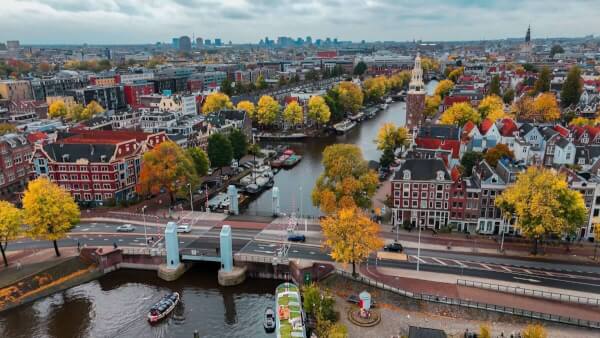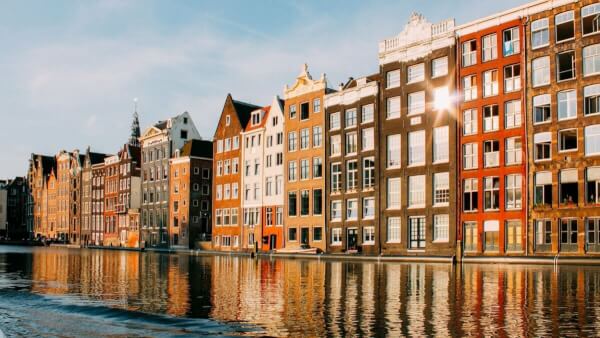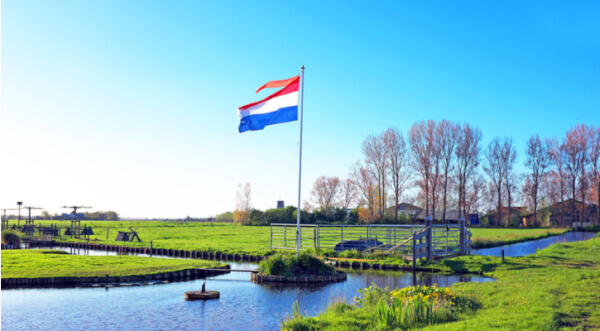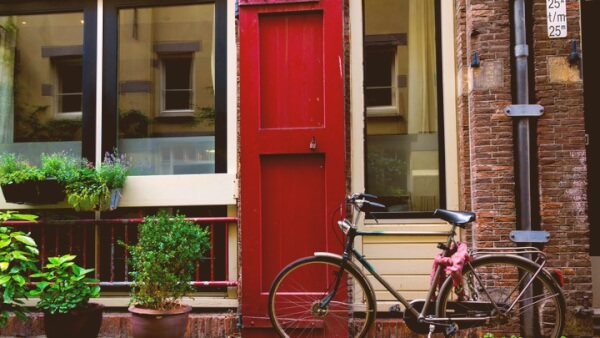Can I keep my Dutch bank account if I move abroad?
Can I keep my Dutch bank account if I move abroad? Find out everything you need to know here in our handy guide.

The Netherlands attracts large numbers of expats coming to work in the global companies based in Amsterdam, and in the many diplomatic institutions around the country. Students, similarly, flock to the country for the world class universities and liberal, relaxed lifestyle. Wherever you find yourself in the Netherlands, the chances are that you’ll be welcomed into a vibrant, mixed community of locals and foreigners.
Before you can relocate, though, you need to find a home. Finding a place to live in Amsterdam can be a challenge, especially if you’re working on a budget. Rental properties move very quickly here, and great apartments in the city centre and suburbs are snapped up in the blink of an eye. The Hague, on the other hand has a somewhat slower rental market, with large numbers of expats due to the diplomatic functions based there. Unsurprisingly, Amsterdam is the most expensive place to live in the Netherlands, with the Hague slightly more reasonably priced overall. Rents in the Hague, on average, are about 50% cheaper than in the capital.
Rotterdam also has a large amount of rental housing stock, and is a city growing in importance in the Netherlands. The other obvious upside to living here is the price. While an ‘average’ city centre one bed apartment in Amsterdam will set you back almost €1350, the same place in Rotterdam comes in at €835. Overall, rental prices in Amsterdam are nearly 80% higher than in Rotterdam - which means you can get a whole lot more house for your money in Rotterdam!
Moving outside of these few largest cities, and into a smaller city or even the countryside, means the prices again drop significantly. Choosing a home in the northern cities of Leeuwarden and Groningen, for example, will cut your rental costs in half compared to living in the capital.
You’ll probably find the rental process in the Netherlands is quite different to in your home country, because of the high level of social housing stock. It’s definitely worth doing your homework, so you understand the market. If you’re thinking of moving to the Netherlands for work or study, then check out this guide to renting in the Netherlands.
About 70% of all rental properties in the Netherlands are social housing, which comes at a fixed, and capped rental price. This is tightly controlled, and only available to families earning below a certain income (currently around €34,000), with significant ties to the area. Usually expats don’t qualify, and even if you do social housing comes with a long wait list.
In most cases, expats look for housing on the open market instead. Because of the high proportion of social housing, private rental properties at a lower price can be scarce in some places. If you’re renting in Amsterdam, for example, you might struggle to find anywhere in the €700 to €1000 bracket. Elsewhere in the country, the market tends to be somewhat more sedate, and you’re more likely to find somewhere you want within your budget.
As well as the usual selection of apartments and houses, you might come across rental arrangements through what’s known as* antikraak* companies. These anti-squatting companies subdivide vacant properties for low rent to deter squatters. This isn’t an ideal arrangement, as tenants here have little to no rights in case of dispute.
If you’re only in the Netherlands for a short time, you can rent a short term apartment fairly easily in most cities - although the cost is relatively high for what you get.
If you choose to use a rental agent then you will be liable for a commission payment. This is usually around a month’s rent. I am expat - the english language site of the Dutch expat community - has a list of estate and rental agents, split by city. On the site you can find advice and tips on finding your perfect rental, as well as personal recommendations of expat service providers.
Alternatively, you can contact owners directly, through small ads in papers, or by responding to the ‘to let’ signs you see in your neighbourhood of choice. It’s also well worth telling people that you’re house hunting, as your contacts might be able to put you in touch with someone looking for a tenant. Many landlords prefer not to use an agent, and will be very happy if arrangements can be made without unnecessary fees being incurred.
Most properties in the Netherlands are offered unfurnished. It’s worth checking with the property owner or agent what condition the property will be in, as unfurnished might mean that there are no carpets or even basic electrical appliances. You can sometimes negotiate with the outgoing tenants to buy their furnishings, but check what your tenancy agreement says about the state the property must be in when you leave. You might find that you have to return it to its ‘unfurnished’ state, by pulling up carpets and removing appliances.
The rental market in the Netherlands might not be quite the same as in your home country. Avoid any nasty surprises by doing a little research before you make your move.
As a tenant in the Netherlands you have rights which are legally protected. It’s virtually impossible for a landlord to abruptly evict a sitting tenant, if the proper contract is in place. Usually, a landlord will have to give several months notice if they want to take the property back from tenants.
A landlord is obliged to carry out any major maintenance needed on the property, and allow a tenant to do any small repairs themselves.
If you think your landlord isn’t treating you fairly, and you can not resolve the issue with them directly, you might have to lodge a complaint with the Rent Tribunal (Huurcommissie). There’s a cost for doing so, and all proceedings would be carried out in Dutch, so you might need a translator to go along with you for meetings.
Before you choose a new home in the Netherlands, you should make sure you know exactly what state the property will be in when you move in (and in what condition it must be returned). Unfurnished properties might have no carpets, no electrical appliances, not even light fixtures.
If you saw the property with a tenant still living there, know that they might be required to remove all soft furnishings such as carpets and curtains, and any electrical appliances they have, and return the apartment to it’s unfurnished state before handover. If you’re not expecting it, it could be a costly surprise.
Verbal contracts are acceptable in the Netherlands, but when it comes to renting a property you should always have the contract details set out in writing. Make sure that all details are covered, and have the document translated into English if you don’t have the language skills to understand the original.
Before you move in, there will be some fees to pay. If you choose to employ an agent there will be a cost - usually about a month’s rent. And your landlord will ask for a deposit, usually the equivalent of a further month’s rent. Of course, you’ll also have to pay your first month’s rent in advance - making a total payment in the region of three months worth of rent.
It’s also important to note that you should never hand over cash as a deposit - use a bank transfer. If you’re making an international money transfer that includes currency conversion, it’s worth finding the best possible deal with a company like Wise so you don’t get slapped with poor exchange rates. More to come about paying from abroad in a later section.
In most cases, the rent you have to pay will be split into two parts - the basic rent and then service charges which are listed separately. Make sure you’re clear on whether the rental price you’re looking at is inclusive (rent and service charges added together to give one single ultimate monthly bill), or exclusive, which means you have to figure out and budget for services on top. Service charges can typically include utilities like gas, water, electricity, internet connection, TV and any building maintenance or service charges applied if you’re in an apartment.
You have the right to change provider for electricity and gas, should you wish to - although it's worth checking your landlord is ok with this. Compare the costs of different providers here. Water, on the other hand, is supplied by only one company, meaning you have no choice but to stick with the provider you have.
Waste collection will usually be included in your rental costs, and arranged according to your local council’s schedule. If you pay your utility costs directly to your landlord, who then uses the cash to pay the bills, he is legally obliged to show you the real cost (by presenting you the various utility bills) at least once a year.
To know whether or not to negotiate, you need to understand the* ‘Woningwaarderingsstelsel’.* This points system sets a base rental rate for social or rent-controlled properties, and is also used as a guideline for properties let on the private market. There are certain circumstances in which this guide does not apply (at the very top end of the market), but it is a useful measure of how fair the proposed rent is.
In the first instance, you can use your knowledge of the points system to negotiate with the landlord or agency. However, if you sign a contract but think that the rent (or other charges levied) is too high, you can subsequently register a complaint at the Huurcommissie (Rent Tribunal), for just EUR 25. They’ll assess the property and can lower the rent or service charges, as long as you register your complaint within the first six months of the contract. If you are unsure, you can find Housing Support Groups, such as the Amsterdam Wijksteunpunt Wonen, who will help.
There’s no legal reason why you can’t get a flat without a job. Landlords will certainly want to check that you’re able to pay the rent for the duration of the lease. As such, if you don’t have a job yet, you might need to offer additional proof in order to rent.
To finalise a rental agreement you’ll have to prove your residency status, identity and that you will be earning enough to cover your costs and service any outstanding debt. In most cases, if you’re a professional you will have to show your new landlord your job contract to show the salary is adequate. If you’re renting as a student, or don’t have a job just yet, you’ll have to show how you intend to pay, for example, by showing a bank statement with enough savings to cover your living expenses.
Once you have your contract for rental all sorted, you can get your BSN (Citizen Service Number). This number is given to your when you start living in the Netherlands and have registered your residence at your local municipality.
If you’re renting on the open market (as most expats will), the landlord and tenant can agree the terms of the rental contract freely. However, within the social housing sector, there are much stricter controls on the contract type.
This means that in all likelihood you will be able to influence the content of your contract, through negotiation with your landlord or agent. At the very least, a tenancy agreement should include the following:
If a notice period is not specified then it’s usually one month. You have to confirm you want to leave at the end of a tenancy agreement, or the contract automatically renews.
If necessary, you can always ask your landlord or agent for amendments to the contract if you think clauses should be added, changed or removed. For example, usually tenancy agreements require you to give one month’s notice to leave. However, you may choose to request the addition of a ‘break clause’ to give you a shorter notice period if you suddenly need to move out because of a work change. There’s no compulsion for a landlord to accept addendums, but it’s not uncommon in cities with large expat communities that frequently relocate.
Monthly rentals can be arranged through specialist short term agencies, but come at a premium.
Many expats tend to travel back home frequently, and there will be times when you need to pay your rent or bills, but might be out of the country. You might even find that you have to pay a deposit or fees to secure your rental before you’ve opened a local bank account or moved to the Netherlands. If you’re making an international money transfer to cover your costs, then it’s worth remembering that your home bank might not offer you the best deal.
Banks tend to include almost carefully hidden administration fees and hide their cut in a poor exchange rate when transferring your money across borders. A specialist provider like Wise moves your money using the real exchange rate - the same one you’ll find on Google. Not to mention, fees are clearly laid out and quite transparent. Leaving you with a fairer, cheaper and likely faster option.
The best way to get a head start on finding a place to rent in the Netherlands is to look online. Great websites to find a house or apartment to rent include:
To find a shared home, you might be best asking around your office or group of friends for recommendations. Otherwise, the best websites to find a flatshare, room rental or roommate, include:
Like anywhere else in the world, you might encounter issues when renting a place in the Netherlands. However, because the law is quite favourable to tenants in the Netherlands, you should be able to get any problems sorted out fairly easily. Housing, and especially the cost and availability of housing in the Netherlands, is a political issue, and there are many groups to help you fix any problems you might encounter.
If you have any problems you can’t resolve directly with your landlord, then your Housing Support Groups is the first place to go. Otherwise, you should contact theHuurcommissie (Rent Tribunal) who can help with ongoing disputes. You have strong rights as a tenant in the Netherlands, so don’t be afraid to raise and resolve issues.
Good luck, and enjoy your new life in the Netherlands!
*Please see terms of use and product availability for your region or visit Wise fees and pricing for the most up to date pricing and fee information.
This publication is provided for general information purposes and does not constitute legal, tax or other professional advice from Wise Payments Limited or its subsidiaries and its affiliates, and it is not intended as a substitute for obtaining advice from a financial advisor or any other professional.
We make no representations, warranties or guarantees, whether expressed or implied, that the content in the publication is accurate, complete or up to date.

Can I keep my Dutch bank account if I move abroad? Find out everything you need to know here in our handy guide.

Everything you need to know about moving to Amsterdam from the UK. Read about visas, popular expat destinations, healthcare and more.

If you’re planning a trip to the stunning city of Amsterdam, you’ll definitely want to time it right for Amsterdam Pride 2023, one of the most unique LGBTQ+...

In the Netherlands, there are more than two weeks worth of national holidays each year. But some of those holidays are more important than others, and banks...

The Netherlands is known for its universal and excellent standard of healthcare and it’s regularly rated as one of the best healthcare systems in the world....

Amsterdam is home to large numbers of international companies, not to mention world class educational institutions. Which means professionals and students...